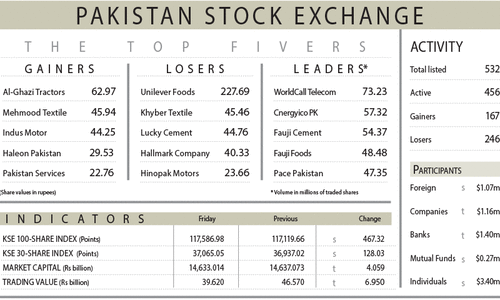ISLAMABAD, July 26: After a near collapse, the Doha development round seems to be back on track as 153 WTO member countries thrashed out a compromise package for agriculture and industrial goods, a senior Pakistani diplomat said.
The most significant issues were to work out cuts on overall trade distorting domestic support by developed countries and cuts in tariffs.
The members would engage in consultations at various levels in order to arrive at final texts by Monday, which would be presented in the Trade Negotiations Committee (TNC).
After a weeklong meeting of 35 trade ministers of leading countries, Pakistan’s Ambassador to WTO Dr Manzoor Ahmed told Dawn that it has been agreed that the US would cut its allowable subsidies by 70 per cent from $48 billion to $14.7 billion while EU has agreed to cut them by 80 per cent.It has also been agreed that developed countries could cut their agricultural tariffs by an average of 60 per cent.
Commerce Minister Ahmad Mukhtar is leading an official delegation to the meeting in Geneva.
Mr Manzoor said the most important area for Pakistan’s concern is cuts for tariffs on industrial goods. It has been agreed that all tariffs in developed countries would be brought below 6.5 per cent under the proposed package.
Thus, current tariff of 19.6 per cent on export of cotton shirts would be reduced to 5.6 per cent or by over 70 per cent. For knitted shirts of man-made fibres where Pakistan could only manage exports of only two million dollars because of high tariffs of 32 per cent, this would now come down to 6.4 per cent, he said.
There are many such new market openings for Pakistani exporters, he said and added similar opportunities would arise in case of EU where Pakistani exporters pay tariffs of eight per cent and 12 per cent on most of their exports.
All these tariffs would be reduced to below five per cent, he said. On top of that generalised system of preference (GSP) of 20 per cent is likely to stay.
This implies a reduction of over 50 per cent in duty on our exports to the EU, Dr Manzoor said and added in many other countries, such as Canada and Australia, also there would be many openings for Pakistani products.
Dr Manzoor said another opportunity for Pakistan is that for many tariff lines where delayed implementation of the Doha Round is being stipulated, for Pakistan such delays would not apply. Thus Pakistan would have an advantage over its competitors, such as China or other developing countries, he said.
“Pakistan did not have to give any significant concession. It would not have to make any cuts in its sensitive sectors, such as automotives/consumer goods. There may be some slight adjustments of import tariffs over the next 10 years,” he clarified.
For example, industrial products, which are at present subject to 25 per cent duty rate may have to be reduced to 18 per cent by 2021. In case of agricultural products, Pakistan would not be required to make any cuts, he added.
Answering a question, he said it is not yet sure whether the package will finally come through. India has voiced strong concerns on the number of special products in agriculture. They feel that in case of any big surge of imports, they would not be able to protect local farmers, he added.
Similarly, Argentina and South Africa expressed grave concerns about the non-agriculture market access (NAMA) package. Intensive negotiations are now going on to make all members agree to a package so that final modalities on agriculture and NAMA could be agreed early next week, Dr Manzoor said.
A number of other significant steps have also to take place before the round can be completed. These include an agreement on services, rules, trade facilitation, geographical indications (GIs) and many such other issues.
Earlier, Commerce Minister Ahmad Mukhtar told the TNC meeting that “we must pave the way to reaching an agreement. The economic conditions across the world require it. We are facing one of the most serious financial crisis in memory. Soaring food and fuel prices have made life extremely difficult for most countries, but some of us are in a much worse condition.”
He said at such a time, the whole world is looking for any good news. The only good news we can give them at this time is Doha round. It is very much doable. Obviously the major economies have to show leadership and take the actions necessary to energise our negotiations this week, he said.
“Each one of us has a reason for this round. For us, it is to save our textiles and clothing industry. More than one-third of our labour force is employed by this sector which accounts for over 60 per cent of our exports. Our textile industry has been waiting for this moment for a long time and I would find it very hard to return empty-handed,” the minister said.












































Dear visitor, the comments section is undergoing an overhaul and will return soon.